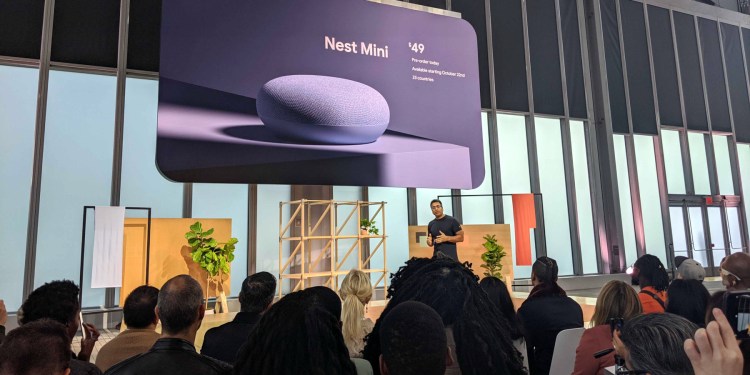testsetset
Google Nest today introduced the second-generation version of Nest Mini, its smallest and most popular smart speaker. The Nest Mini comes with a wall mount, better bass, and a dedicated ML chip so machine learning can run locally.
The speaker will cost $49 and goes on sale October 22 in 23 countries. It comes in chalk, coral, charcoal, and a new sky blue option.
“The primary benefit of the local processing is really speed for the stuff you do every day — turning on your lights or stopping music,” Google Nest product manager Chris Chan told VentureBeat in an interview after the event.
With up to a teraop of processing power, the chip remembers things you do most often to make responses to voice commands faster. Though Nest Mini uses more on-device machine learning, the device is unable to operate without a Wi-Fi connection.
June 5th: The AI Audit in NYC
Join us next week in NYC to engage with top executive leaders, delving into strategies for auditing AI models to ensure fairness, optimal performance, and ethical compliance across diverse organizations. Secure your attendance for this exclusive invite-only event.
“It has a very heavy bias toward stuff happening on the device — like speech recognition, natural language understanding — it’s actually happening right there. In many cases the text synthesis, as well,” Chan said.
A faster Google Assistant with the ability to respond to multi-turn dialog is also coming to Pixel 4 smartphones.
Though more can be done with on-device machine learning using Google Assistant on Nest Mini, the device still shares voice recordings with Google and requires a Wi-Fi connection.
Since the release of the first Home Mini in 2017, the hockey puck-shaped device has become one of the best-selling smart speakers in the world, alongside Amazon’s Echo Dot in the U.S. and Alibaba and Baidu devices in China.
Like most of the news Google announced today at its hardware event in New York City, word that a second-generation Nest Mini was in the works leaked months ago.
A wall mount offers users the option of saving counter space while still enjoying quick access to far-field voice detection. Microphones equipped with this type of AI can pick up voice commands for music or smart home control from across an average-sized room.
Naturally, competitors are working along similar lines. At an event at its headquarters in Seattle last month, Amazon introduced invite-only glasses and a ring with Alexa inside, as well as the Echo Flex, which contains a microphone and can be plugged into wall outlets to extend the range of voice recognition in the home. Like the Home Mini with wall mount, the Echo Flex is designed to let people expand the range of voice commands in their home.
A fall hardware event has become something of a tradition for Google, a time to roll out Pixel smartphones, smart speakers, and new Google Assistant features.
In keeping with expectations, Google today announced new Pixel Buds, a new Pixelbook, Nest Wifi with a Google Assistant speaker inside, and the latest version of Google’s flagship smartphone — the Pixel 4 with facial recognition and Motion Sense for quick gesture control and Google Assistant access.
At its previous hardware event, Google introduced the Home Hub, the company’s first-party smart display. Last month, Google also introduced the Nest Hub Max, a facial recognition-powered smart display that uses Google’s Face Match program to personalize what it displays, with recommendation engine results based on the person in front of the device.
Updated 9:11 a.m. to include additional information from Google Nest product manager Chris Chan.


